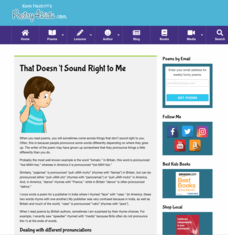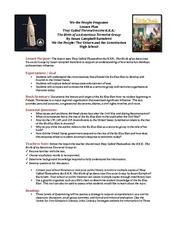Curated OER
Rhyming Words: Spoon and Moon
One of these things is not like the other, one of these things does not belong. It's true! Little learners will say each of the four words in each of four rows, to determine which one does not rhyme with the others. After that, they...
Curated OER
Cool and Not-So-Cool Materials
Why do some materials feel cool to the touch, but not others? Learn about thermal conductors and thermal insulators with a fun science experiment. First, kids read the results of an experiment with spoons and hot water. They then try...
Curated OER
Maus: Making a Visual Representation
How do you represent a tragic event? Are stories of tragic events better left untold? After reading chapter two of Maus and studying other representations of the Holocaust (suggestions are included), class members create a representation...
Super Duper Publications
WH Question Cards - Pro: Who, What, When, Where, Why
Do you have kids on your caseload with wh questions goals, that need extra practice comprehending and asking who, what, when, where, and why questions? Then this clever app is designed for you!
Civil War Trust
The Common Civil War Soldier
Imagine you are a soldier in the Civil War. What are you wearing? What do you need to carry with you? Examine the life of a person during the Civil War, from drummer boys to powder monkeys to musket-toting soldiers. Elementary...
Poetry4kids
That Doesn’t Sound Right to Me
Does pajamas rhyme with llamas to you? If it does (and even if it doesn't), an online lesson on rewording poetry for regional pronunciation may be helpful for you and your students.
K12 Reader
Adverbs of Frequency II
Describe your daily activities with adverbs of frequency. Kids recall which things they seldom do, they rarely do, they frequently do, and the things that they never do.
Curated OER
'Me Fail English? That's Unpossible' : Studying Literature with "The Simpsons"
Does your class love The Simpsons? It might seem dated, but with reruns constantly popping up on television, this show still holds the attention of most of your learners. Play the opening sequence of an episode, and brainstorm any...
Curated OER
Real-life Problems: Dollars and Cents
Do your fourth graders love money? They'll solve these money math word problems with ease! Six word problems involving money prompt pupils to use addition, subtraction, multiplication, and division. A section for work reinforces the...
Curated OER
Information Overload: Looking at News
How do events reported in mainstream newspapers, on television news, blog posts, and social network sites differ? Ask your class to investigate the way the same news item is presented in the many information sources available. Groups...
Learning for Life
Trust Me - I Won't Let You Down
What is fairness? What does it mean to be trustworthy? Learners explore these concepts in an important life skills lesson, which includes reading a story, responding to sample scenarios, and classroom discussion.
National Institute of Open Schooling
Spontaneity of Chemical Reactions
Do spontaneous reactions really occur? Activity 12 in a series of 36 focuses on spontaneity of chemical reactions. Learners read about, discuss, and answer questions pertaining to entropy, explain the third law of thermodynamics, explore...
Classics for Kids
Instrumental Sounds
What sound does a piccolo make? What's the difference between a violin and viola? What family does a timpani belong to? Take a tour through the different sections of an orchestra with an interactive reference tool.
Curated OER
Waves and Currents
Students are introduced to the forces that are responsible for generating waves in the ocean and how these forcesf differ from those that cause currents. They are able to explain how water molecules in a wave do not move in the direction...
Curated OER
Warm Up: When Modern Human Behavior Appeared in Early Hominids
Upper graders or entry college level learners use the provided article links to answer three questions regarding early modern human behavior. They compose short essay responses that accommodate each part of the overarching question,...
Curated OER
Make a Van Gogh-Style Self-Portrait
Learn by doing! Young artists try their hand at creating their own self-portraits in the style of Vincent van Gogh. This worksheet contains a brief explanation of the essential qualities of van Gogh's art: complementary colors and...
Curated OER
Reading the Play
Do figures of speech enhance a play or story? In small groups, learners locate and describe figures of speech they find while reading a reader's theater play. After making predictions, they describe how the figures of speech make the...
Curated OER
Healthy Eating
A short, yet very informative, presentation on the basics of healthy eating. Young dieticians view slides which have colorful photos and graphics of foods that are healthy (and not so healthy), along with information on the basic food...
Curated OER
The United Nations
What does the United Nations do? This highly informative presentation gives learners an overview of the types of jobs, policies, and functions of the UN. Note: This resource is text-heavy and would be most appropriate for children in...
Curated OER
The Called Themselves the K.K.K.; The Birth of an American Terrorist Group
How did Ku Klux Klan develop and flourish in the US? How did the government respond to acts of terrorism conducted by the KKK following the Civil War? How does the government respond to acts of terrorism today? This resource...
Curated OER
Being Forceful
Young scientists consider the forces of push and pull, start and stop, and try to categorize each one correctly. There are five cartoon drawings of kids performing an activity. Learners must write push or pull, and start or stop in the...
Curated OER
Introduce Vocabulary: Cross a Bridge (Hunter)
What does suspension mean? Learn this and other bridge-related vocabulary as scholars listen to Ryan Ann Hunter's nonfiction book, Cross a Bridge. This strategy can be applied to any book. Before reading, acquaint pupils...
Curated OER
Introduce Vocabulary: Firefighters (Mitten)
Your budding readers know what it's like to get to a word and think, "What does that mean?" Expand their vocabulary in context using Christopher Mitten's nonfiction picture book Firefighters. Get them ready by pre-teaching the new...
Illustrative Mathematics
Calculating the square root of 2
Does a calculator give you the exact value of the square root of 2? Here, learners must decide if 1.414236 is equal to the square root of 2. They must also explain why the square root of 2 could never be equal to a terminating decimal....
Other popular searches
- Picture Does Not Belong
- Al Capone Does My Shirts
- Do and Does
- Does
- Which Word Does Not Belong
- Does Not Belong
- How Does Light Travel
- Sentence Does Not Belong
- Which Does Not Belong
- Anansi Does the Impossible
- Does Salt Evaporate
- Where Does Food Come From

























